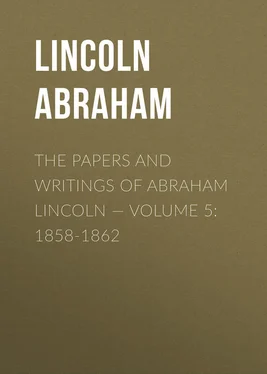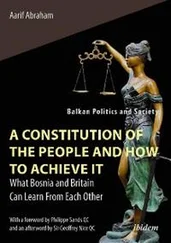Abraham Lincoln - The Papers And Writings Of Abraham Lincoln — Volume 5 - 1858-1862
Здесь есть возможность читать онлайн «Abraham Lincoln - The Papers And Writings Of Abraham Lincoln — Volume 5 - 1858-1862» — ознакомительный отрывок электронной книги совершенно бесплатно, а после прочтения отрывка купить полную версию. В некоторых случаях можно слушать аудио, скачать через торрент в формате fb2 и присутствует краткое содержание. Жанр: foreign_antique, foreign_prose, на английском языке. Описание произведения, (предисловие) а так же отзывы посетителей доступны на портале библиотеки ЛибКат.
- Название:The Papers And Writings Of Abraham Lincoln — Volume 5: 1858-1862
- Автор:
- Жанр:
- Год:неизвестен
- ISBN:нет данных
- Рейтинг книги:4 / 5. Голосов: 1
-
Избранное:Добавить в избранное
- Отзывы:
-
Ваша оценка:
- 80
- 1
- 2
- 3
- 4
- 5
The Papers And Writings Of Abraham Lincoln — Volume 5: 1858-1862: краткое содержание, описание и аннотация
Предлагаем к чтению аннотацию, описание, краткое содержание или предисловие (зависит от того, что написал сам автор книги «The Papers And Writings Of Abraham Lincoln — Volume 5: 1858-1862»). Если вы не нашли необходимую информацию о книге — напишите в комментариях, мы постараемся отыскать её.
The Papers And Writings Of Abraham Lincoln — Volume 5: 1858-1862 — читать онлайн ознакомительный отрывок
Ниже представлен текст книги, разбитый по страницам. Система сохранения места последней прочитанной страницы, позволяет с удобством читать онлайн бесплатно книгу «The Papers And Writings Of Abraham Lincoln — Volume 5: 1858-1862», без необходимости каждый раз заново искать на чём Вы остановились. Поставьте закладку, и сможете в любой момент перейти на страницу, на которой закончили чтение.
Интервал:
Закладка:
There are two main objects, as I understand it, of this Harper's Magazine essay. One was to show, if possible, that the men of our Revolutionary times were in favor of his popular sovereignty, and the other was to show that the Dred Scott decision had not entirely squelched out this popular sovereignty. I do not propose, in regard to this argument drawn from the history of former times, to enter into a detailed examination of the historical statements he has made. I have the impression that they are inaccurate in a great many instances, — sometimes in positive statement, but very much more inaccurate by the suppression of statements that really belong to the history. But I do not propose to affirm that this is so to any very great extent, or to enter into a very minute examination of his historical statements. I avoid doing so upon this principle, — that if it were important for me to pass out of this lot in the least period of time possible, and I came to that fence, and saw by a calculation of my known strength and agility that I could clear it at a bound, it would be folly for me to stop and consider whether I could or not crawl through a crack. So I say of the whole history contained in his essay where he endeavored to link the men of the Revolution to popular sovereignty. It only requires an effort to leap out of it, a single bound to be entirely successful. If you read it over, you will find that he quotes here and there from documents of the Revolutionary times, tending to show that the people of the colonies were desirous of regulating their own concerns in their own way, that the British Government should not interfere; that at one time they struggled with the British Government to be permitted to exclude the African slave trade, — if not directly, to be permitted to exclude it indirectly, by taxation sufficient to discourage and destroy it. From these and many things of this sort, judge Douglas argues that they were in favor of the people of our own Territories excluding slavery if they wanted to, or planting it there if they wanted to, doing just as they pleased from the time they settled upon the Territory. Now, however his history may apply and whatever of his argument there may be that is sound and accurate or unsound and inaccurate, if we can find out what these men did themselves do upon this very question of slavery in the Territories, does it not end the whole thing? If, after all this labor and effort to show that the men of the Revolution were in favor of his popular sovereignty and his mode of dealing with slavery in the Territories, we can show that these very men took hold of that subject, and dealt with it, we can see for ourselves how they dealt with it. It is not a matter of argument or inference, but we know what they thought about it.
It is precisely upon that part of the history of the country that one important omission is made by Judge Douglas. He selects parts of the history of the United States upon the subject of slavery, and treats it as the whole, omitting from his historical sketch the legislation of Congress in regard to the admission of Missouri, by which the Missouri Compromise was established and slavery excluded from a country half as large as the present United States. All this is left out of his history, and in nowise alluded to by him, so far as I can remember, save once, when he makes a remark, that upon his principle the Supreme Court were authorized to pronounce a decision that the act called the Missouri Compromise was unconstitutional. All that history has been left out. But this part of the history of the country was not made by the men of the Revolution.
There was another part of our political history, made by the very men who were the actors in the Revolution, which has taken the name of the Ordinance of '87. Let me bring that history to your attention. In 1784, I believe, this same Mr. Jefferson drew up an ordinance for the government of the country upon which we now stand, or, rather, a frame or draft of an ordinance for the government of this country, here in Ohio, our neighbors in Indiana, us who live in Illinois, our neighbors in Wisconsin and Michigan. In that ordinance, drawn up not only for the government of that Territory, but for the Territories south of the Ohio River, Mr. Jefferson expressly provided for the prohibition of slavery. Judge Douglas says, and perhaps is right, that that provision was lost from that ordinance. I believe that is true. When the vote was taken upon it, a majority of all present in the Congress of the Confederation voted for it; but there were so many absentees that those voting for it did not make the clear majority necessary, and it was lost. But three years after that, the Congress of the Confederation were together again, and they adopted a new ordinance for the government of this Northwest Territory, not contemplating territory south of the river, for the States owning that territory had hitherto refrained from giving it to the General Government; hence they made the ordinance to apply only to what the Government owned. In fact, the provision excluding slavery was inserted aside, passed unanimously, or at any rate it passed and became a part of the law of the land. Under that ordinance we live. First here in Ohio you were a Territory; then an enabling act was passed, authorizing you to form a constitution and State Government, provided it was republican and not in conflict with the Ordinance of '87. When you framed your constitution and presented it for admission, I think you will find the legislation upon the subject will show that, whereas you had formed a constitution that was republican, and not in conflict with the Ordinance of '87, therefore you were admitted upon equal footing with the original States. The same process in a few years was gone through with in Indiana, and so with Illinois, and the same substantially with Michigan and Wisconsin.
Not only did that Ordinance prevail, but it was constantly looked to whenever a step was taken by a new Territory to become a State. Congress always turned their attention to it, and in all their movements upon this subject they traced their course by that Ordinance of '87. When they admitted new States, they advertised them of this Ordinance, as a part of the legislation of the country. They did so because they had traced the Ordinance of '87 throughout the history of this country. Begin with the men of the Revolution, and go down for sixty entire years, and until the last scrap of that Territory comes into the Union in the form of the State of Wisconsin, everything was made to conform with the Ordinance of '87, excluding slavery from that vast extent of country.
I omitted to mention in the right place that the Constitution of the United States was in process of being framed when that Ordinance was made by the Congress of the Confederation; and one of the first Acts of Congress itself, under the new Constitution itself, was to give force to that Ordinance by putting power to carry it out in the hands of the new officers under the Constitution, in the place of the old ones, who had been legislated out of existence by the change in the Government from the Confederation to the Constitution. Not only so, but I believe Indiana once or twice, if not Ohio, petitioned the General Government for the privilege of suspending that provision and allowing them to have slaves. A report made by Mr. Randolph, of Virginia, himself a slaveholder, was directly against it, and the action was to refuse them the privilege of violating the Ordinance of '87.
This period of history, which I have run over briefly, is, I presume, as familiar to most of this assembly as any other part of the history of our country. I suppose that few of my hearers are not as familiar with that part of history as I am, and I only mention it to recall your attention to it at this time. And hence I ask how extraordinary a thing it is that a man who has occupied a position upon the floor of the Senate of the United States, who is now in his third term, and who looks to see the government of this whole country fall into his own hands, pretending to give a truthful and accurate history o the slavery question in this country, should so entirely ignore the whole of that portion of our history — the most important of all. Is it not a most extraordinary spectacle that a man should stand up and ask for any confidence in his statements who sets out as he does with portions of history, calling upon the people to believe that it is a true and fair representation, when the leading part and controlling feature of the whole history is carefully suppressed?
Читать дальшеИнтервал:
Закладка:
Похожие книги на «The Papers And Writings Of Abraham Lincoln — Volume 5: 1858-1862»
Представляем Вашему вниманию похожие книги на «The Papers And Writings Of Abraham Lincoln — Volume 5: 1858-1862» списком для выбора. Мы отобрали схожую по названию и смыслу литературу в надежде предоставить читателям больше вариантов отыскать новые, интересные, ещё непрочитанные произведения.
Обсуждение, отзывы о книге «The Papers And Writings Of Abraham Lincoln — Volume 5: 1858-1862» и просто собственные мнения читателей. Оставьте ваши комментарии, напишите, что Вы думаете о произведении, его смысле или главных героях. Укажите что конкретно понравилось, а что нет, и почему Вы так считаете.












